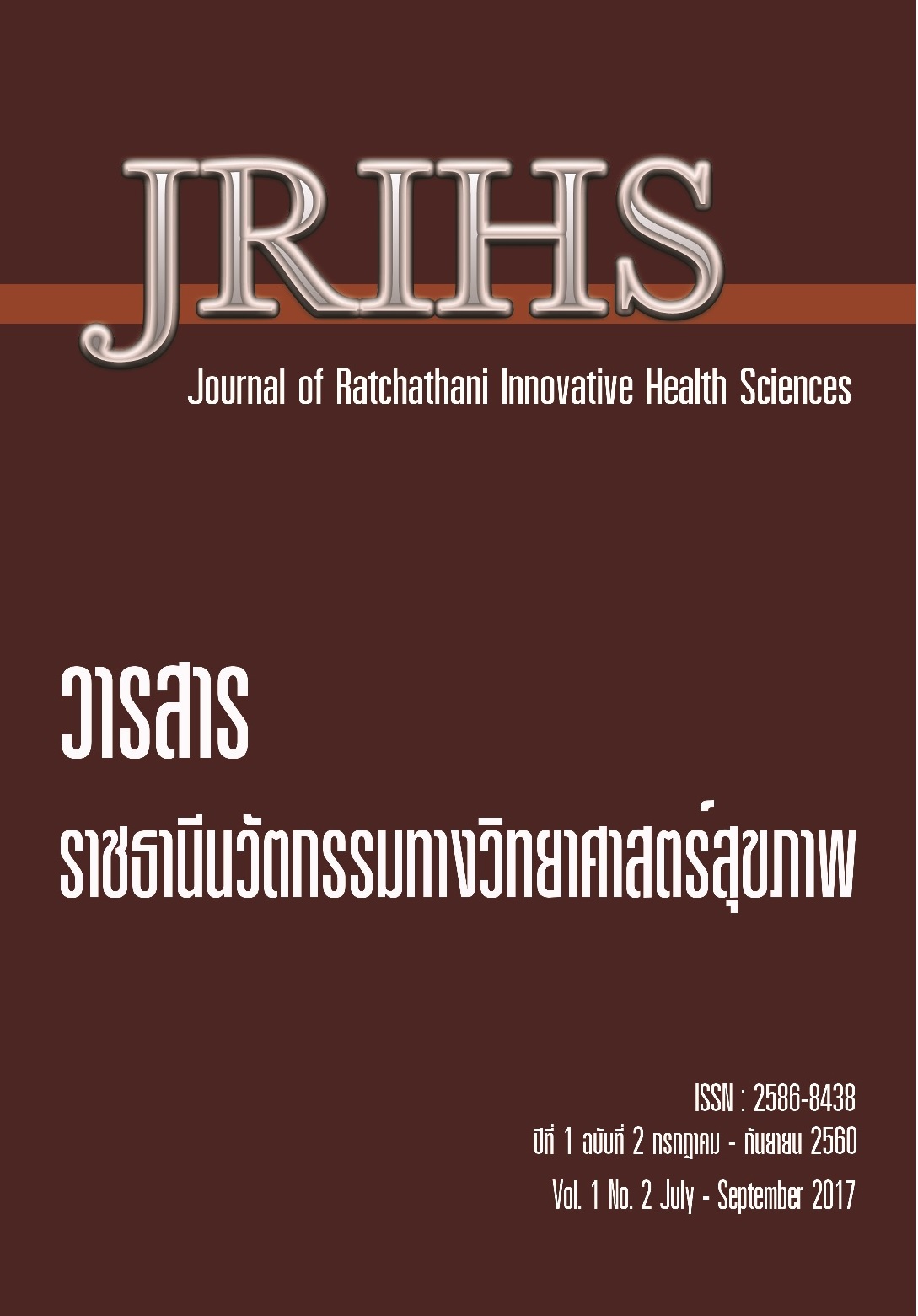Application of Self-Efficacy Program on Self-Care Behaviors in Hypertensive Patients at Yo Health Promoting Hospital, Kham Khuean Kaeo District, Yasothon Province
Main Article Content
Abstract
This quasi-experimental research aimed to study the effect of self-efficacy program on self-care behaviors in hypertensive patients at Yo Health Promoting Hospital, Kham Khuean Kaeo District, Yasothon Province. The study was two group pre-post test design. The sample were totally 88 subjects, divided into experimental group consisted of 44 subjects and comparison group consisted of 44 subjects. The subjects in the experimental group attended 5 activities for 12 weeks in self-efficacy program. These 5 activities included 1) providing knowledge and direct experience to control blood pressure 2) interpersonal relation practice 3) motivation 4) evaluation of physiological changes and 5) follow-up to a self-care practice alert. The comparison group got routine conventional health care services from their Sub-district Health Promoting Hospital. Data collected using an interview.The data was analyzed by descriptive statistics, percentage, mean, standard deviation and analyzed with analytical statistics, paired t–test and independent’s t-tests.
The result was shown that after attending the program, the sampling group got higher average score for self-efficacy and was able to utilize self-care behaviors to prevent complications from hypertension better than before attending the program, with statistically significant difference, compared to the normal group. Consequently, the sampling group’s hypertension level had decreased compared to the level before they attended the program, and to the normal group with statistically significant difference. The results of the study showed that the self-efficacy program could increase the perceived self-efficacy, led to an improvement of health, and then affect hypertensive patients to be able to control the systolic and diastolic pressure in appropriate level.
Article Details
ความคิดเห็นและข้อเสนอแนะใดๆ ที่นำเสนอในบทความเป็นของผู้เขียนแต่เพียงผู้เดียว โดยบรรณาธิการ กองบรรณาธิการ และคณะกรรมการวารสารราชธานีนวัตกรรมทางวิทยาศาสตร์สุขภาพไม่ได้มีส่วนเกี่ยวข้องแต่อย่างใด มหาวิทยาลัยราชธานี บรรณาธิการ และกองบรรณาธิการจะไม่รับผิดชอบต่อข้อผิดพลาดหรือผลที่เกิดขึ้น จากการใช้ข้อมูลที่ปรากฏในวารสารฉบับนี้
References
ตนเองเพื่อส่งเสริมพฤติกรรมการออกกำลังกายของผู้ป่วยโรคความดันโลหิตสูงชนิดไม่ทราบสาเหตุ. วารสารวิชาการ Veridian E-Journal, 7(1), 62-72.
กระทรวงสาธารณสุข. (2550). ข้อมูลข่าวสารสาธารณสุข. สำนักนโยบายและยุทธศาสตร์ สำนักงาน ปลัดกระทรวงสาธารณสุข.
จันจิราภรณ์ วิชัย, สายสมร พลดงนอกและ กิตติศักดิ์ สวรรยาวิสุทธิ์. (2558). ความรู้เรื่องโรคความดันโลหิตสูง = Hypertension. พิมพ์ครั้งที่ 1. ขอนแก่น: หน่วยสร้างเสริมสุขภาพงานเวชกรรมสังคม โรงพยาบาลศรีนครินทร์.
โรงพยาบาลส่งเสริมสุขภาพตำบลย่อ. (2560). ทะเบียนผู้ป่วยโรคความดันโลหิตสูง โรงพยาบาลส่งเสริมสุขภาพตำบลย่อ ปี 2560. ยโสธร: โรงพยาบาลส่งเสริมสุขภาพตำบลย่อ.
ธาริณี พังจุนันท์ และนิตยา พันธุเวทย์. (2556). ประเด็นสารรณรงค์วันความดันโลหิตสูงโลก. นนทบุรี: สำนักโรคไม่ติดต่อ กรมควบคุมโรค.
ราตรี ผลสาลี่. (2553). การรับรู้ความสามารถตนเองร่วมกับแรงสนับสนุนทางสังคมในการส่งเสริมพฤติกรรมออกกำลังกายของผู้สูงอายุโรคความดันโลหิตสูงชมรมผู้สูงอายุไร่ขิงเมตตาประชารักษ์จังหวัดนครปฐม. กรุงเทพฯ: มหาวิทยาลัยมหิดล.
ยุภาพร นาคกลิ้ง, ทัศนีย์ รวิวรกุล, พิมพ์สุรางค์ เตชะบุญเสริมศักดิ์ และวราภรณ์ เสถียรนพเก้า. (2555). ผลของการประยุกต์ทฤษฎีความสามารถตนต่อพฤติกรรมการควบคุมอาหารการออกกำลังกายและระดับความดันโลหิตของผู้สูงอายุโรคความดันโลหิตสูง. วารสารวิทยาลัยพยาบาลบรมราชชนนีกรุงเทพ, 28(1), 160-70.
ยุพา จิ๋วพัฒนกุล, อุบลวรรณา เรือนทองดี และฐิติรัตน์ ทับแก้ว. (2555). ผลของโปรแกรมการออกกำลังกายโดยการแกว่งแขนร่วมกับครอบครัวต่อพฤติกรรมการออกกำลังกายของผู้สูงอายุ โรคความดันโลหิตสูงชนิดไม่ทราบสาเหตุ. วารสารพยาบาลศาสตร์, 30(2), 46-57.
สมาคมความดันโลหิตสูงแห่งประเทศไทย. (2558). แนวทางการรักษาโรคความดันโลหิตสูงในเวชปฏิบัติทั่วไป (Guidelines on the Treatment of Hypertension). กรุงเทพฯ: สมาคมความดันโลหิตสูงแห่งประเทศไทย.
สุนันทา ศรีศิริ. (2555). ผลของโปรแกรมการส่งเสริมสมรรถนะแห่งตนในการปรับเปลี่ยนพฤติกรรมสุขภาพของผู้สูงอายุโรคความดันโลหิตสูง ศูนย์บริการสาธารณสุข 19 วงศ์สว่างกรุงเทพมหานคร. วารสารคณะพลศึกษา, 15 (ฉบับพิเศษ) ธันวาคม.
สำนักนโยบายและยุทธศาสตร์ กระทรวงสาธารณสุข. (2555). สถิติสาธารณสุข พ.ศ. 2555. นนทบุรี:กระทรวงสาธารณสุข
สำนักโรคไม่ติดต่อ กรมควบคุมโรค. (2560). รูปแบบการบริการป้องกันควบคุมโรคเบาหวานความดันโลหิตสูงสำหรับสนับสนุนการดำเนินงาน NCD Clinic Plus. พิมพ์ครั้งที่ 1. นนทบุรี: โรงพิมพ์ชุมนุมสหกรณ์การเกษตรแห่งประเทศไทย.
Bandura, A. (1977). Self-Efficacy: Toward a Unifying Theory of Behavioral Change.
Psychological Review, 84 (2), 191-215.
Bandura, A. (1998). A Self-efficacy: The Exercise of Control. New York: W.H. Freeman.
Cohen, J. (1988). Statistical power analysis for the behavioral sciences. 2nd ed. New Jersey: Lawrence Erlbaum Associates Publishers.
World Heart Federation. (2014). CVD Prevention Roadmap Summit 2014. Available at http://www.world-heart-federation.org (Accessed March 25th, 2017)


